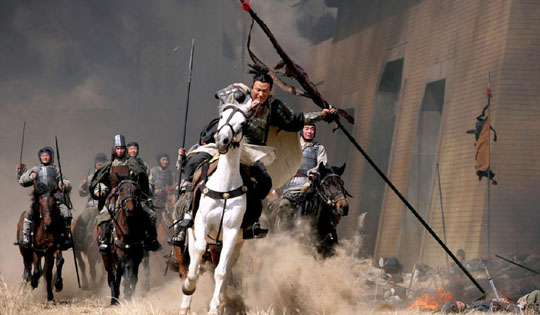A prominent example of how modern technology altered the world is seen in the way men wage war. In John Woo's battle extravaganza "Red Cliff," set in China in 208, armies fight with spears and shields and bare hands; they traverse deserts and treacherous mountain paths on foot and subsist on little more than rice and water, with the occasional stolen water buffalo to still the craving for protein. A simple message from one general took weeks or even months to reach another, and the fighting itself lasted for decades. The torch flame of triumph and/or revenge was passed from father to son to grandson, often right there on the battlefield. And if the soldiers had it rough, the civilians, most of them farmers, had to endure pillaging, rape and arson, their tilled and seeded farmland turned overnight into a wasteland of corpses.
"Red Cliff" brings all that and more to the screen — a whopping two and a half hours (and this is just the first of two parts) of frenzied action, feverish passion and elegantly choreographed battle scenes emphasized by some extremely realistic sound effects of splattering guts and shattering bones, punctuated with the screams from panicked masses. "But . . . this certainly is war!" goes one of the early lines, spoken by a robed court adviser. He sure got that right.
"Red Cliff" is based on the legendary Battle of Red Cliff, which Woo declares is his favorite chapter in "Romance of the Three Kingdoms," written by Luo Guangzhong in the 14th century.

















With your current subscription plan you can comment on stories. However, before writing your first comment, please create a display name in the Profile section of your subscriber account page.